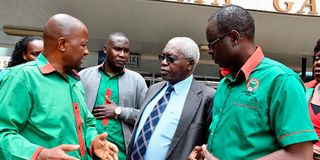Knut proposes new levy to fund learning in public schools

From left: Knut Nairobi Branch Chairman Nyamai Kasina, Knut National Assistant Executive Alvans Washington, Presidential Working Party on Education Reform Chairperson Prof. Raphael Munavu and Knut Nairobi Branch Secretary Macharia Mugwe confer with one another during public hearings on education reforms held at the University of Nairobi on November 11, 2022.
You will give more of your earnings to the taxman if a proposal by a teachers union to introduce a new education levy to finance public education is adopted.
The proposal by the Kenya National Union of Teachers (Knut) was made on Wednesday to the Presidential Working Party on Education Reforms (PWPER) that is collecting views from the public.
It is likely to draw strong reaction from a public that is already heavily taxed.
The secretary-general of the union Collins Oyuu said that the current money allocated to education is inadequate and said that all working Kenyans should be deducted an unspecified fraction of their earning for the education kitty.
The union suggested that the PWPER works out the final details of how such a levy would be operationalised. Mr Oyuu said that it could adopt the fuel, insurance and hotels levy model.
Independent body
“The problem, even with Competency Based Curriculum is funding. The funds should be channeled to an independent body with a national board of 11 representatives from the regions. The board should have representations from teachers, Unions and parents and should have management at the county level.” Mr Oyuu said, adding that capitation to schools should not be uniform but rather dependent on the social-economic background of where schools are located.
He spoke at the Knut headquarters in Nairobi when union officials hosted the team that was led by its chair Prof Raphael Munavu.
Education financing was also at the heart of the presentation by the Kenya Union of Post-Primary Teachers (Kuppet) before the working party.
The union proposed an increase of the budgetary allocation to the education sector to be raised from the current 25.9 per cent of the national budget to about 30 per cent.
“This suggestion will meet a ready response from the government, that several other sectors are competing for those funds. Well, such mechanical responses don’t take into account the massive contribution of the education sector to this country,” said the secretary-general of Kuppet, Akello Misori.
He termed the current allocation “a drop in the ocean” and called on Parliament to allocate more money to ease the burden on parents. The cost of education has been a main concern for many parents since the roll-out of the competency-based curriculum (CBC).
“Education is a public good and we can’t subject it to more debate. The government should provide learning resources so that there is equity and equality across all counties. Working party can recommend the right mix of budget to support education,” Mr Misori.
Contrasting views
Knut and Kuppet presented deeply contrasting views on the domiciling of Junior Secondary School (JSS). Whereas Knut wants the new segment fitted the primary school structure, Kuppet argued that only secondary schools have the infrastructure and manpower to handle the curriculum content for JSS. Mr Oyuu proposed that the JSS should be renamed intermediate school.
“Unless anyone is coming from the moon, only secondary schools have the human resources, libraries, laboratories and more importantly the culture for JSS. Teachers at that level are trained to deal with adolescents, whose onset starts at thirteen years, and sometimes even at twelve years,” Mr Misori said.
However, the two unions agreed on the need to slowly phase out boarding schools and embrace day schooling. They also agreed on the restructuring pre-service teacher training to align it with the CBC.
“Capacity building of teachers is very essential for effective implementation of the CBC and achieving quality education. It enriches teachers with knowledge in the designs for the new system of learning and pedagogy,” Mr Misori said.
Additional reporting by Janet Koech




